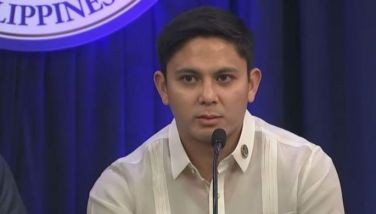Duterte to concede to BBL if federalism bid fails
MANILA, Philippines - A Bangsamoro Basic Law (BBL) in place is good enough for President Duterte if federalism fails to gather enough support.
“I foresee that towards the end of the year, we’d be able to come up with the framework (on) federalism. But if the Filipino nation and a plebiscite would not want it, then I am ready to concede (to) whatever is there in the BBL,” Duterte said at Friday’s Hariraya festival in Davao City.
The stance, he said, would ensure that Muslims in Mindanao get their share when the territories in the country are redefined.
He said his administration is working on a framework where everyone is represented, including those from the left and the right of center.
In talking about a reconfiguration of boundaries, Duterte said the areas in Mindanao that are mostly populated by the Tausug people and often associated with Moro National Liberation Front founder Nur Misuari might also have to be divided.
“We will have new boundaries and these boundaries do not really intend to separate our brother Moro from the Christian. Rather, it is intended only to delineate territories. But that should not keep us apart from being Mindanaoans,” Duterte said.
Although separated by religious beliefs, he added Muslims could not entirely drive Christians out of their lands as many have become closely related to one another.
“So, let us accept each other. Let us build a nation that will be founded on peace and understanding,” the President said.
Any reconfiguration of boundaries, he emphasized, will not come overnight. “Certainly, it will not come next year. Probably, it will be something about two to three years from now. But I assure you that something will change before I end my term,” he stressed.
Presumptive Senate president Aquilino Pimentel III, for his part, said limitations to the full implementation of the decentralization measures under the Local Government Code of 1991 hinder the delivery of basic services like health care and education by local governments.
Abbin Dalhani, PDP-Laban National Capital Region council president, said under the current unitary government structure, government authority and function are focused on the national capital, to the detriment of those in the provinces.
Speaking at a forum in Manila yesterday, former Senate president Aquilino Pimentel Jr. made another pitch for federalism, saying it would give local governments “greater powers, much more than what was envisioned in the Local Government Code.”
He said he had hoped that under the Local Government Code he authored and steered to enactment in 1991, “overconcentration of powers to the central government in Manila would be reduced.”
He recalled that it happened with the devolution of the functions of the Departments of Agriculture, Health and Social Welfare and Development that are all part of the central government, to local government units.
But he also mentioned the downside of the law, like when the DSWD had to bear the burden of delivering services in the aftermath of Typhoon Yolanda in 2013, when local governments “should have known better.”
The former senator proposes that under a federal form of government, federal states should benefit from government income as 80 percent of all forms of state revenues, including taxes, would be divided among federal states.
Currently, local governments are entitled to internal revenue allotments (IRA).
Pimentel also proposed 11 states to be formed under a federal government, patterned after the current regional and language boundaries.
For Luzon, it will be composed of Northern Luzon (Ilocos, Cagayan and Cordillera regions), Central Luzon, Southern Tagalog (the provinces of Cavite, Laguna, Batangas, Rizal and Quezon) and Bicol.
Four states will be formed in the Visayas with slight changes, namely: Eastern Visayas (Samar and Leyte provinces); Central Visayas (the present region plus Masbate); Western Visayas (Ilonggo provinces); Mimaropa (the present Region 4-B).
Mindanao will be composed of the states of Northern Mindanao (Zamboanga and Northern Mindanao regions), Southern Mindanao (Davao, SOCCSKSARGEN and Caraga regions) and the Bangsamoro state (the present Autonomous Region in Muslim Mindanao).
Metro Manila, meanwhile, will be the federal capital.
Under a federal government, Pimentel said that up to six senators would represent each federal state, including Metro Manila.
Also, the three branches of government will be distributed across the country, with the executive branch situated in Metro Manila, the legislature in the Visayas and the judiciary in Mindanao.
- Latest
- Trending





























